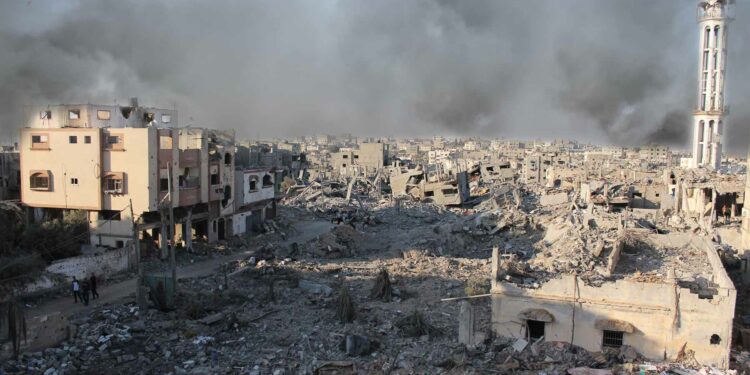A judge placed Rached Ghannouchi, the 81-year-old speaker of the dissolved parliament, and leader of Tunisia’s main political party Ennahda – a prodemocracy, Islam-inspired party – under a detention warrant for “plotting against state security.” The warrant, issued on April 20, came almost two years after President Kaïs Saïed’s firing of the prime minister, one year after his dissolution of the parliament, and just days after the arrest of other opposition figures. These politically-motivated arrests are part of a campaign of repression that Saïed has carried out since late 2021, and are a major blow for Tunisia’s democratic transition.
Sadly, the recent events are nothing new. Politicians, journalists, magistrates, and businessmen have been imprisoned, in recent months. The common denominator among them is their opposition to the president and resistance to what they see to be Saïed’s abuses of power. These detainees, like most of Tunisia’s political class, accuse the president of having organized a ‘constitutional coup,’ when he dismissed the prime minister and government and froze the parliament on July 25, 2021, before finally dissolving it in March 2022. This event marks the beginning of Tunisia’s downslide from a pluralist democracy, which was in a consolidation phase, to a regime that is both authoritarian and autocratic. How and why did Tunisia, the only success story among the Arab Spring nations, end up spiraling back into authoritarianism? What likely scenarios could unfold? And what should be done to ensure that Tunisia continues its path to democracy, rather than spiraling back into violence and instability?
Tunisia’s descent into authoritarianism
The primary cause of Tunisia’s backslide into authoritarianism lies in the figure, the will, and political beliefs of Saïed, who is a constitutional law expert, and former law professor, who ran as an independent candidate. Saïed publicly argued, long before his election into office, that “representative democracy failed,” and the role played by political parties was obsolete. Instead, he claims that “direct democracy” is the only form of legitimate democracy. However, since his election in 2019, Saïed has shown a willingness to disrupt or even thwart representative democracy, through preventing the appointment of new ministers to replace those dismissed, and postponing the establishment of a constitutional court. Analysts and opponents stated long before July 25, 2021, when Saïed opposed the establishment of a constitutional court, that such opposition could open the way for the dissolution of parliament or even to a constitutional dictatorship. A constitutional court itself could provide checks and balances of executive power, and help avert crises, such as the one that appears to be unfolding in Tunisia.
Saïed’s ascent – rallying against elite corruption
The second cause of the current political crisis is the regime’s double headedness, or the significant powers of both the president and prime minister in Tunisia’s political system, and the inter and intra-party struggles. This double headedness can function well in consolidated democracies, but local political practices have strengthened the presidency of the republic since the early years of Béji Kaïd Sebsi, the first elected president of Tunisia after the adoption of a democratic constitution in 2014, and a secularist who served between 2014-2019. The de facto, and a-constitutional strengthening of the powers of the president, encouraged by the internal discord within the parliamentary blocs, and the reservation, or even timidity, of the Islamists of Ennahda, who fear a repetition of an Egyptian-style coup d’état, made Tunisia a quasi-presidential regime well before the election of Saïed in 2019. The authoritarian tradition of Tunisian politics has favored this trend. Saïed, a former law professor without fortune, a party, or a political past, presented himself as a long-awaited savior, through rallying against elite corruption and emphasizing its impact on the poor. With sizeable mass support, Saïed has been imposing authoritarianism, with some of his supporters affectionately calling him ‘the Tsar.’
Socio-economic failures and authoritarianism
The final causes of the crisis are the post-revolutionary, socio-economic failures which have hit ordinary citizens hard and paved the way for Saïed’s authoritarianism. A decade after the revolution economic growth fell to an annual average of 1.7 per cent, and rising unemployment now affects most of the population. Public debt has doubled since 2010, rising to 84 per cent of Gross Domestic Product in 2021. However, Saïed himself has done little to address the worsening economic and employment crisis, and faith in the political system appears to be at a low. Only about one in 10 registered voters cast ballots in the legislative elections. According to a field survey, it seems that the majority of those elected to the Assembly of the Representatives of the People (ARP) belong to political parties, and only five per cent of young people between the ages of 18 and 25 voted in the second round of legislative elections. On the one hand, Saïed campaigned for a mass vote, without which his “direct democracy” would be inconceivable. On the other hand, the rejection of political parties is a fundamental element of his political theory and practice, as he himself stood for election as a simple non-partisan citizen.
Saïed has not been able to offer a political-institutional or socio-economic solution to the crisis. With his back to the wall, he is making desperate moves to give himself some oxygen through using conspiracy-ridden and sometimes frankly xenophobic, speech. This populist discourse is accompanied by attacks on the political class, but repression is only a stopgap measure given the failure of his political rescue project.
Possible scenarios
Is it possible for Tunisia to get out of the crisis with Saïed or without him? Economically, the only possible, but unlikely lifeline at the moment, would be a substantial financial commitment from the Gulf states, notably the United Arab Emirates and Saudi Arabia. It must be noted that Saïed seems to have relied heavily on them during the preparation of his 25 July’s move as well as after it, as was the case when both states offered billions of dollars to Egypt after 2013 Abdel Fatteh el-Sisi’s coup. But Tunisia is not Egypt, in terms of its size and geopolitical influence. Furthermore, Saïed is not Sisi – he is not the head of a powerful army, and could offer little in return to these leaders, and financiers of the Arab counter-revolution.
A political way out of the crisis seems possible if the president proceeds with the release of all political detainees, the cancellation of the anti-constitutional decrees that have, since 2021, dismantled both the representative structure and the governance apparatus of the post-revolutionary state. This possible outcome, however, is difficult to implement given the rigid politics of the president. What remains is a one-time intervention by the army – and while it is desired by several Tunisian political actors, including the former president Moncef Marzouki, history teaches us that when the military enters, no one knows when it will leave.
Local actors backed by international powers should take center stage
Apart from a new popular uprising, like the Jasmine Revolution, that would topple the Saïed regime, the only effective solution would be a political initiative for an inclusive national dialogue from within Tunisian civil society organizations, such as the National Dialogue Quartet, made up of the Tunisian General Labor Union (UGTT), the Tunisian Confederation of Industry, Trade and Handicrafts (UTICA), the Tunisian Human Rights League (LTDH), and the Tunisian Order of Lawyers (ONAT). The Quartet intervened effectively and resolved the serious crisis of 2013-2014, a feat for which they were awarded the Nobel Peace Prize in 2015, and was a positive example of locally led and driven diplomacy. But given that the current context, civil society, and the Quartet will need the support of the international community, particularly the African Union, the European Union, and the United Nations. Such a dialogue should be supported through immediate international economic and diplomatic pressure to bring the Tunisian protagonists, including Saïed, to the negotiating table to find a political compromise that saves face to everyone. The establishment of a government of national unity with powers that cannot be opposed by the president, and a cabinet that would be in place until elections in 2024, seem like an ideal temporary solution. Furthermore, this course of action would pave the way for economic aid from Tunisia’s democratic allies and negotiations with the International Monetary Fund that could ease the social, political, and economic tensions and halt a possible descent into violence in Tunisia.
Professor Maati Monjib is a Moroccan historian and human rights defender, who is a specialist in North African politics and African history.







